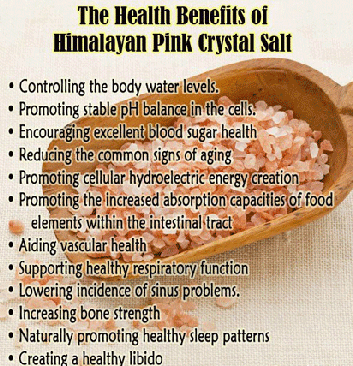Salt




Salt ↑ Blood Pressure

Salt intake is usually limited with PKD with elevated blood pressure. Some are limited to 1200 mg of sodium/day. This is equivalent to an eighth teaspoon of salt. If one cooks all their own food and does not add any salt to prepared dishes, then an additional amount of daily salt (other than naturally occurring within vegetables), one can sprinkle an eighth teaspoon on foods. See the pulldown menu for many medical articles on limiting salt intake and lowering blood pressure.
Himalayan Pink Salt
Try a taste test with different salts: table salt, seasalt, fleur de sel, celtic gray salt, salt from Brittany, and Himalayan pink crystal salt. Some of the best tasting seems to be the Himalayan pink salt. It contains a mixture of all electrolytes in similar proportions that exist within the human body. I was skeptical at first to try it, but later I noticed it did not seem to create any rise in blood pressure. Others who have had a transplant cannot use any salt at all or they puff up like a balloon.I think Himalayan salt is preferable to sea salt, fleur de sel, gray salts. Himalayan salt just tastes better. Morton salt or table salt contains aluminum, that's why it pours. Aluminum has been implicated in the brains of Alzheimer's patients. I think older people tend to eat a lot of prepared foods, TV dinners and use tons of table salt. I find grinding my own salt through a salt mill is preferable when trying to limit salt intake.
Salt Linked to Immune Rebellion
"A sophisticated analysis of the complicated chemistry needed to form a T-helper 17 cell - which involved carefully monitoring cells and reverse engineering the changes - identified a critical gene. But the gene had been seen before.
"Its day job is to increase salt uptake in the gut," said Dr Vijay Kuchroo from Brigham and Women's Hospital. "When we put extra salt in the culture dish it was one of those 'Aha' moments, the cells were becoming T-helper 17 cells."
"Mice fed a high-salt diet were more likely to develop a disease similar to MS in experiments."
Tolvaptan Slows PKD Kidney Disease Progress
"Thirst, polyuria, and related adverse events may affect the ability of some PKD patients to take effective doses of tolvaptan," Torres and colleagues wrote. "The potential effects on liver-enzyme levels and plasma levels of sodium and uric acid require monitoring."
The study was limited because the researchers could not detect any of the drug's effects on hypertension, and because all patients were asked to maintain good hydration and avoid thirst, which may have underestimated the drug's effects upon the disease of PKD.
In an accompanying editorial, Rudolf Wuthrich, MD, of University Hospital Zurich, and Changlin Mei, MD, of Changzheng Hospital in Shanghai, noted that there were no effects on the "worsening trajectories of hypertension and albuminuria."
"Assuming that tolvaptan causes structural rather than functional improvements, one would have expected beneficial effects on urinary protein excretion and blood pressure," they wrote. Nonetheless, they said the trial "represents a major advancement in the quest for a cure for ADPKD," adding that clinicians will need to balance the risks and benefits of an aquaretic drug with its impact on delays in dialysis and transplantation, as well as diminished pain.
Tolvaptan not FDA approved for PKD treatment
Tolvaptan (Samsca) has not been approved for the treatment of ADPKD. Though tolvaptan does diminish the rate of kidney cyst growth, there is a question if tolvaptan can cause irreversible liver damage. The FDA has issued a CRL, a complete response letter to Otsaka.
Dietary Salt Restriction helps PKD
A study was done that found salt decreases helped PKD Polycystic Kidney Disease tremendously,

Optimal blood pressure for individuals with PKD is between 120/80 - 110/70 - 100/60